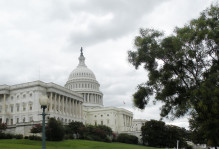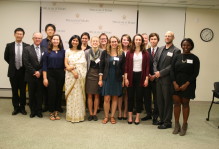IR Winter Seminar: Day 7 & 8
January 11: The last two days of our winter seminar emphasized the practical application of grand strategy – how abstract theories can be translated into concrete foreign policies. We compared the six main grand strategies’ positions regarding American action in response to a variety of foreign threats: terrorism, rogue states, nuclear proliferation, and the rise of a rival great power, as well as their views on humanitarian intervention. For me, these discussions were particularly helpful in further distinguishing between the grand strategies. Professor Oakes emphasized how we can directly relate each theories’ fundamental beliefs about the nature of the international system to their ultimate foreign policy recommendations.
We also engaged in a class discussion over the Obama administration’s grand strategy, which was often criticized for its inconsistency, poor articulation, and lack of credibility. While there was some variety in opinion, most of the class argued that the outgoing administration expressed a hybrid grand strategy that included tenets of primacy, selective engagement, and neoliberal institutionalism; one term offered for this hybrid was ‘selective neoliberal institutionalism.’ In addition, students attempted to predict the Trump administration’s grand strategy – a myriad of different opinions were offered, but no definite consensus was concluded.
Our final two days incorporated four external speakers, each with a discipline or regional focus. First, Randy Burkett from the Center for the Study of Intelligence engaged the class in a discussion about the causes of terrorism, ultimately concluding that it is a problem of “young men.” Trevor Rudolph, a W&M alumnus and former Chief of the Cyber and National Security Unit in the Office of Management and Budget, discussed the growing threat of cyberspace, specifically discussing the claims of Russian involvement in the U.S. presidential election. I found both of these discussions particularly thought-provoking – not only were the two speakers incredibly well-spoken, but their knowledge of their respective fields was inspiring. On Tuesday, the seminar visited the Center for Strategic & International Studies, a top research organization in DC, where we heard from Melissa Dalton about the ongoing situation in Syria. What struck me most about this discussion was her suggestion that, ultimately, Syria will no longer exist as a unitary state. Finally, Ashley Tellis from the Carnegie Endowment for International Peace explained his views on grand strategy and how different strategies will lead to different foreign policies with regard to China.
This seminar exceeded my expectations. It provided an unparalleled opportunity to not only absorb a wealth of knowledge about American grand strategy, but also to actively engage with the foreign affairs and policy community in Washington, while learning valuable skills about finding jobs in DC and networking. I would, without a doubt, recommend this opportunity to all fellow students interested in international affairs or looking to work in DC someday.
Regards,
Meredith




No comments.
Comments are currently closed. Comments are closed on all posts older than one year, and for those in our archive.